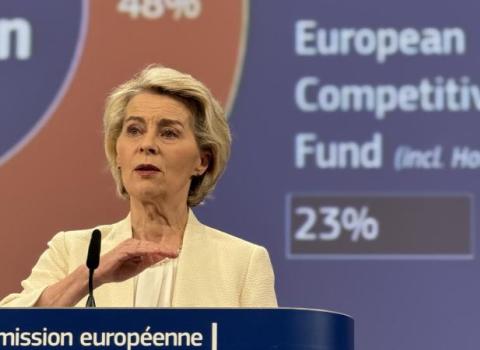
More on this story
Former dean: ‘mistake’ was made, but dismissal ‘out of proportion’
As the Karolinska Institutet faculty are responsible for the award of the Nobel Prize for Physiology or Medicine, the university is particularly sensitive to ethical issues. Vice Dean Nancy Pedersen has stepped in until Karolinska decides what to do about the Dean’s position. Tryggvason could not be reached for comment by phone by Science|Business.
The charges
The first issue, says Wallberg-Henriksson, is that Tryggvason emailed the chairperson of the independent committee, suggesting that two applicants who did not make the final list should be included to receive funding, thus attempting to influence the committee.
The second is that the former dean, who was involved in selecting the committee, didn’t instruct the committee on how to handle conflicts of interest. As it turned out, one of the committee members had conflicts of interest with four of the professors under consideration to receive Prominent Professors funding.
The third problem, Wallberg-Henriksson said, is that the grants process was not transparent, and the criteria by which the applicants were judged were not made clear.
According to Wallberg-Henriksson, all three aspects were the former Dean’s responsibility. Tryggvason was responsible for the KI programme, announced on 4 December 2009 as part of the school’s strategic initiative to develop quality research. As Dean, he handled the programme, including oversight of an independent evaluation committee that selected the professors who were to receive the funds.
However, Karolinska management received a letter from a number of professors questioning the selection process, prompting Wallberg-Henriksson to appoint a task force to look at the process.
This investigation concluded that Tryggvason had deviated from the conflict of interest rules and practice of the scientific community, and had, “exerted undue influence on the process.” The Karolinska Institutet has stringent conflict of interest rules that went into effect from April 2006.
Iceland-born Tryggvason joined the Karolinska Institutet in 1995 as professor of medical chemistry. He is a member of the Nobel Assembly that is responsible for choosing the winner(s) of the Nobel Prize for Medicine and cofounder of two biotechnology companies, BioStratum Inc. and NephroGenex Inc.
Private email revealed
The trigger for the investigation was a message from Tryggvason’s private email account to the committee chair suggesting that two additional professors be considered for funding. The chairperson, Joe Goldstein, agreed to add the two, and sent his own email back to the entire committee, another person at Karolinska, and to Tryggvason, with the private email attached.
“We never would have seen it [if] the chairperson hadn’t sent it back agreeing that those two professors be moved up the list,” Wallberg-Henrikson said. “In this country and I’m sure in the United States you don’t influence a committee.”
Wallberg-Henriksson told Science|Business that she doesn’t blame the committee, because the members were not instructed on how they should handle such things. “Of course when the Dean said, ‘we should do it like this’ they did, because of course they didn’t know,” she said.
The committee member with the conflict of interest had published quite a few papers with the four professors under consideration, Wallberg-Henriksson said, and while he didn’t grade the professors for the awards, he did send around comments about them, “which of course also is absolutely against the rules.”
In addition, a committee member was added later in the process, and the criteria for what should be judged changed during the contest. “The Dean really held this process close to himself. He didn’t really run all the decisions through the board, and of course that was the problem,” Wallberg-Henriksson said.
Making a point
The dismissal comes after the Swiss Institute of Technology, ETH Zurich, announced last September that chemist and Vice President of Research and Corporate Relations Peter Chen was resigning after an independent investigation confirmed data in two papers and a doctoral thesis published in 1999 and 2000 were falsified.
When ETH’s Chen came under a cloud of questions last year, he stepped down. In Tryggvason’s case, Wallberg-Henriksson did not give him an opportunity to resign, but instead dismissed him as Dean, although for the time being he still retains his professorship.
Tryggvason admitted the charges against him, Wallberg-Henriksson said, but she felt it important to stress the university’s strict conflict of interest rules. “His comment was, ‘This was not very smart. This was very stupid of me,’” she said. “I appoint the Dean, and if things like this happen I dismiss the Dean, which of course I never have done in the six-and-a-half years since I’ve been president: I can’t recall that any president has had to do this.”
Wallberg-Henriksson added that she didn’t give Tryggvason the option of resigning because, “I felt like I need to show the faculty, our university, the scientific community, and the general public that this is totally unacceptable and it’s not how things are done typically. I look upon this as a very serious violation.”
The committee assessing the Prominent Professors grants received 147 applications and made 35 awards. The amount of money is small, SEK 35 million (€3.6 million) per year for each of five years, divided by the 35 winners. “So it’s not a whole lot of money,” she said. “It’s more the prestige of being elected for this.”
The process seems tainted now, and as a result Wallberg-Henriksson said she has, “Asked my legal advisors whether or not I can [rescind] the decision. I’m sure the committee probably did a really great job [...] it’s unfortunate we have these problems with conflicts of interest [...] because people don’t trust the process.”





 A unique international forum for public research organisations and companies to connect their external engagement with strategic interests around their R&D system.
A unique international forum for public research organisations and companies to connect their external engagement with strategic interests around their R&D system.